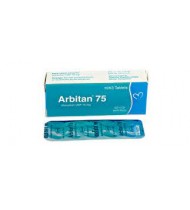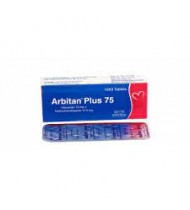Irbesartan + Hydrochlorothiazide
Indications
Patients with stage 2 (moderate or severe) hypertension are at relatively high risk for cardiovascular events (such as strokes, heart attacks, and heart failure), kidney failure, and vision problems, so prompt treatment is clinically relevant. The decision to use a combination as initial therapy should be individualized and may be shaped by considerations such as the baseline blood pressure, the target goal, and the incremental likelihood of achieving goal with a combination compared with monotherapy.
Pharmacology
Irbesartan is a specific competitive antagonist of AT1 receptors with a much greater affinity (more than 8500-fold) for the AT1 receptor than for the AT2 receptor, and no agonist activity.
Blockade of the AT1 receptor removes the negative feedback of angiotensin II on renin secretion, but the resulting increased plasma renin activity and circulating angiotensin II do not overcome the effects of irbesartan on blood pressure.
Irbesartan does not inhibit ACE or renin or affect other hormone receptors or ion channels known to be involved in the cardiovascular regulation of blood pressure and sodium homeostasis. Because irbesartan does not inhibit ACE, it does not affect the response to bradykinin; whether this has clinical relevance is not known.
Hydrochlorothiazide: Hydrochlorothiazide is a thiazide diuretic. Thiazides affect the renal tubular mechanisms of electrolyte reabsorption, directly increasing excretion of sodium and chloride in approximately equivalent amounts. Indirectly, the diuretic action of hydrochlorothiazide reduces plasma volume, with consequent increases in plasma renin activity, increases in aldosterone secretion, increases in urinary potassium loss, and decreases in serum potassium. The renin-aldosterone link is mediated by angiotensin II, so coadministration of an angiotensin II receptor antagonist tends to reverse the potassium loss associated with these diuretics.
Dosage & Administration
Add-on/Replacement therapy: Irbesartan 150 to 300 mg & Hydrochlorothiazide 12.5 to 25 mg orally once a day
Maximum dose: Irbesartan 300 mg & Hydrochlorothiazide 25 mg orally once a day
Interaction
Contraindications
Side Effects
Hydrochlorothiazide: Anorexia, Epigastric distress, Hypotension, Orthostatic hypotension, Photosensitivity, Anaphylaxis, Anemia, Confusion, Erythema multiforme, Stevens-Johnson syndrome, Exfoliative dermatitis including toxic epidermal necrolysis, Dizziness, Hypokalemia and/or hypomagnesemia, Hyperuricemia, Headache
Pregnancy & Lactation
Thiazides cross the placenta, and use of thiazides during pregnancy is associated with a risk of fetal or neonatal jaundice, thrombocytopenia, and possibly other adverse reactions that have occurred in adults.
Nursing Mothers: It is not known whether irbesartan is excreted in human milk, but irbesartan or some metabolite of irbesartan is secreted at low concentration in the milk of lactating rats.
Thiazides appear in human milk. Because of the potential for adverse effects on the nursing infant, a decision should be made whether to discontinue nursing or discontinue the drug, taking into account the importance of the drug to the mother.
Precautions & Warnings
Lactation: Discontinue drug or do not nurse
Use in Special Populations
- Mild to moderate renal dysfunction (CrCl 30 mL/min or greater): No adjustment recommended
- Severe renal dysfunction (CrCl less than 30 mL/min): Not recommended
Overdose Effects
To obtain up-to-date information about the treatment of overdosage, a good resource is a certified regional Poison Control Center. Telephone numbers of certified Poison Control Centers are listed in the Physicians’ Desk Reference (PDR). In managing overdose, consider the possibilities of multiple-drug interactions, drug-drug interactions, and unusual drug kinetics in the patient.
Laboratory determinations of serum levels of irbesartan are not widely available, and such determinations have, in any event, no established role in the management of irbesartan overdose.
Acute oral toxicity studies with irbesartan in mice and rats indicated acute lethal doses were in excess of 2000 mg/kg, about 25- and 50-fold the MRHD (300 mg) on a mg/m2 basis, respectively.
Hydrochlorothiazide: The most common signs and symptoms of overdose observed in humans are those caused by electrolyte depletion (hypokalemia, hypochloremia, hyponatremia) and dehydration resulting from excessive diuresis. If digitalis has also been administered, hypokalemia may accentuate cardiac arrhythmias. The degree to which hydrochlorothiazide is removed by hemodialysis has not been established. The oral LD50 of hydrochlorothiazide is greater than 10 g/kg in both mice and rats.
Therapeutic Class
Storage Conditions
Arbitan Plus Tablet 75 mg
IndicationsIrbesartan & Hydrochlorothiazide tablet are indicated for the treatment of hypertensi..
6.03Tk.
Arbitan Plus Tablet 75 mg
IndicationsIrbesartan & Hydrochlorothiazide tablet are indicated for the treatment of hypertensi..
6.03Tk.
Arbitan Plus Tablet 75 mg+12.5 mg
IndicationsIrbesartan & Hydrochlorothiazide tablet are indicated for the treatment of hypertensi..
6.03Tk.
Cavazide Tablet
IndicationsIrbesartan & Hydrochlorothiazide tablet are indicated for the treatment of hypertensi..
6.00Tk.
Cavazide Tablet
IndicationsIrbesartan & Hydrochlorothiazide tablet are indicated for the treatment of hypertensi..
12.00Tk.
Cavazide Tablet 300 mg+12.5 mg
IndicationsIrbesartan & Hydrochlorothiazide tablet are indicated for the treatment of hypertensi..
24.00Tk.



